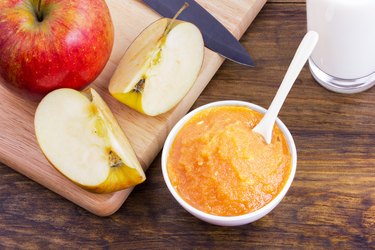
A colonoscopy is a testing procedure designed to give doctors a clear view of your colon and rectum. Doctors use this procedure to diagnose the presence of potential tissue abnormalities such as polyps, inflammation, ulcers and colorectal cancer. While you can drink certain liquids prior to a colonoscopy, you cannot eat applesauce or any other food.
Colonoscopy Basics
Video of the Day
During a colonoscopy, your doctor examines your colon and rectum with a small camera mounted on a flexible, lighted tube called a colonoscope. Just before the procedure, you will receive some sedation or anesthesia to put you to sleep. Your doctor then inserts a colonoscope through your rectum and carefully examines your tissues. He can remove small polyps and take tissue samples with the colonoscope.
Video of the Day
Food Restrictions
In the days prior to your procedure, your doctor will give you a set of written instructions that details what you must do to prepare. Part of this preparation is not eating solid foods for a period of one to three days before your colonoscopy takes place. You will also need to abstain from any liquids that contain purple or red dye. You can have clear liquids, including water, plain coffee or tea, gelatin, strained fruit juice, fat-free broth or bouillon and sports drinks, during this time.
Additional Requirements
You will need to tell your doctor about any medications, supplements or vitamins you use, as well as any current medical conditions, before you have the procedure. Your colon must be clear for a colonoscopy to be effective. To achieve the proper conditions, your doctor may ask you to take enemas and laxatives to soften your stool and speed up your bowel movements on the night before your procedure.
After a Colonoscopy
A colonoscopy takes roughly half an hour. After the procedure, you will typically feel fine. Potential issues following a colonoscopy include excess gas and wooziness. To avoid any problems stemming from post-procedure disorientation, your doctor will likely request that you have someone drive you home.
Considerations
Regular colorectal exams can help prevent the development of colorectal cancer. In its early stages, this form of cancer may present no obvious symptoms, and without a colonoscopy you may develop relatively advanced disease without your knowledge.
Is this an emergency? If you are experiencing serious medical symptoms, please see the National Library of Medicine’s list of signs you need emergency medical attention or call 911.